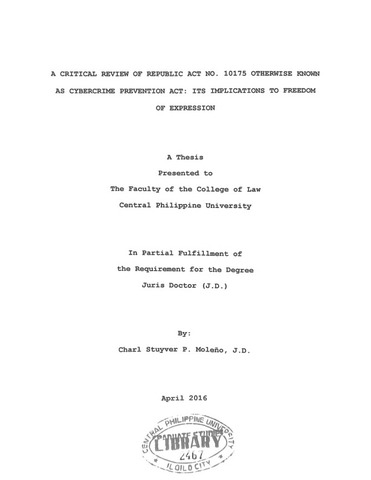A critical review of Republic Act No. 10175 otherwise known as Cybercrime Prevention Act: Its implications to freedom of expression
| dc.contributor.adviser | Alibogha, Salex | |
| dc.contributor.author | Moleño, Charl Stuyver P. | |
| dc.date.accessioned | 2021-02-08T08:47:41Z | |
| dc.date.available | 2021-02-08T08:47:41Z | |
| dc.date.issued | 2016 | |
| dc.identifier.citation | Moleño, C.S. P. (2016). A critical review of Republic Act No. 10175 otherwise known as Cybercrime Prevention Act: Its implications to freedom of expression (Unpublished postgraduate thesis). Central Philippine University, Jaro, Iloilo City. | en_US |
| dc.identifier.uri | https://hdl.handle.net/20.500.12852/227 | |
| dc.description | Abstract only | en_US |
| dc.description.abstract | This research specifically intended to determine the salient provisions of RA 10175 which are vague or ambiguous; to find out the salient provision of RA 10175 which is violative of the freedom of expression clause of the 1987 Constitution; and determine the perception of selected law students about RA 10175 whether or not certain provisions need to be amended. Content analysis was employed in this study because it is "the longest established method of text analysis among the set of empirical methods of social investigation". Cyberlibel is any inaccurately or injuriously written defamation triggered via electronic means, including the Internet, social media, email and websites. Cyberlibel creates instant and irrevocable reputation damage. On the other hand, under Article 353 of the Revised Penal Code, libel is defined “as a public and malicious imputation of a crime, or of a vice or defect, real or imaginary, or any act, omission, condition, status or circumstance tending to cause dishonor, discredit or contempt of a natural or juridical person, or to blacken the memory of one who is dead.” Thus, this study was conducted to review the salient provisions of the aforementioned law and analyzed its implications to the freedom of expression. The law may have the good intentions but the sole objective of this study is to determine whether Sec 4 (c) 4 of RA 10175 otherwise known as Cyber Libel is a clear violation of the Freedom of Expression Clause provided for in Article III of the 1987 Philippine Constitution. On the other hand, jurisprudence and opinions of several highly respected legal experts were downloaded from the Internet and additional materials were collected from other legal means. Questionnaires were also given to 20 random students from Central Philippine University College of Law. The respondents of this study believes that Cyber Libel was created because many politicians were being extremely scrutinized in Social Networking sites; thus, these law makers created a Law, the cyber libel, so that they could use this as a cloak against their critics. Furthermore, after analyzing all the data gathered, it clearly shows that there is a need to amend RA 10176 specifically Sec.4(c)4 which is the provisions of Cyber Libel, in order to conform with the evolving technology today. | en_US |
| dc.format.extent | ii, 48 leaves | en_US |
| dc.language.iso | en | en_US |
| dc.subject.ddc | GSL Theses 340.72 M732 | en_US |
| dc.subject.lcsh | Computer crimes | en_US |
| dc.subject.lcsh | Cyber crimes | en_US |
| dc.subject.lcsh | Internet crimes | en_US |
| dc.subject.lcsh | Cybercrimes | en_US |
| dc.subject.lcsh | Constitutional rights | en_US |
| dc.title | A critical review of Republic Act No. 10175 otherwise known as Cybercrime Prevention Act: Its implications to freedom of expression | en_US |
| dc.type | Thesis | en_US |
| dc.description.bibliographicalreferences | Includes bibliographical references | en_US |
| dc.contributor.department | College of Law | en_US |
| dc.description.degree | Juris Doctor | en_US |
| local.subject | Cybercrime Prevention Act | en_US |
| local.subject | RA 10175 | en_US |
| local.subject | Freedom of expression | en_US |
이 항목의 파일
This item appears in the following Collection(s)
-
Juris Doctor [144]


